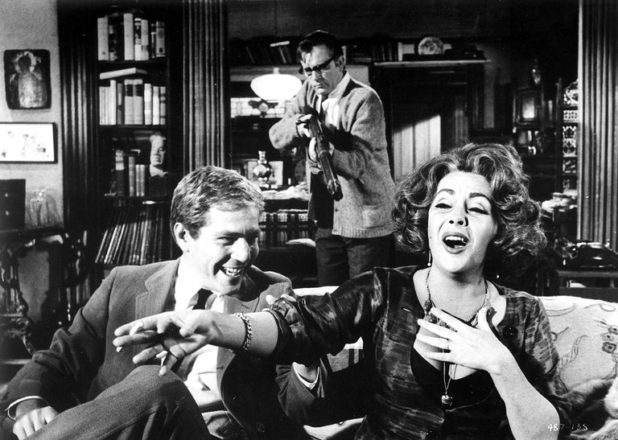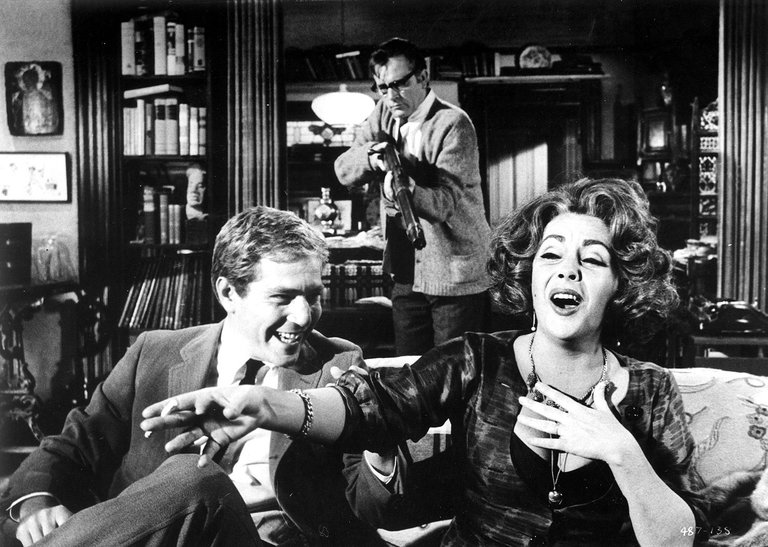Eric Striker
Daily Stormer
May 24, 2017

The Edward Albee Estate, which owns the rights to the award-winning “Who’s Afraid of Virginia Woolf?” took a stand against a Portland director’s request to revise the work and cast a negro and a white woman together as the protagonists. The stated intention was to make the play into an advertisement for interracial dating.
The writer, Edward Albee, passed away last fall. He was notorious for his high casting standards and specific demands when it came to requests to perform his work.
The character in question, Nick, is specifically described as being a man of European descent, and nothing in the play is about miscegenation or interracial sex. This is just another attempt to take a relatable story about marriage and interpret it in a way that advances dominant Jewish ideology.
Even though the director, Michael Streeter, was planning to put this show on in a theater the size of a matchbox, he nevertheless rushed to the eager Jew York Times to try and turn an agent abiding by the rules of a posthumous copyright holder into a political witch hunt.
A decision by the estate of Edward Albee not to allow a production of “Who’s Afraid of Virginia Woolf?” to cast a black actor as a blond character is reigniting decades-long debates in the theater world over race, casting and authorial control.
A theater producer in Portland, Ore., said last week that Albee’s agent, representing his estate, refused to grant him the rights to present the play with a black actor, Damien Geter, playing the supporting role of Nick, a young biologist at a small New England college. The Albee office, through a spokesman, said the producer had mischaracterized the status of his application for rights to the production, but confirmed that it objected to a black actor in that role.
“It is important to note that Mr. Albee wrote Nick as a Caucasian character, whose blonde hair and blue eyes are remarked on frequently in the play, even alluding to Nick’s likeness as that of an Aryan of Nazi racial ideology,” Sam Rudy, a spokesman for the Albee estate, said in a letter to Michael Streeter, the producer. “Furthermore, Mr. Albee himself said on numerous occasions when approached with requests for nontraditional casting in productions of ‘Virginia Woolf’ that a mixed-race marriage between a Caucasian and an African-American would not have gone unacknowledged in conversations in that time and place and under the circumstances in which the play is expressly set by textual references in the 1960s.”
…
Albee, one of the nation’s leading 20th-century playwrights, was known for his tight control over professional productions of his plays, insisting on approval of casts and directors while he was alive; directors were often required to submit head shots of proposed cast members before receiving the rights to mount his plays. He died in September, and this is the first posthumous controversy over his legacy to come to light.
“I do not question the motives of those that made the decision — I think they have some fealty to a sense of integrity to Edward Albee’s desires,” Mr. Streeter said in an email. He had planned a non-Equity production of the play this fall at the 35-seat Shoebox Theater in Portland. “But I had hoped the negative aspects of Albee would die with him.” He added, “I think the benefits of casting Nick with an African-American actor outweigh the drawbacks.”Mr. Streeter set off a debate about the Albee estate’s position on casting when he posted on his Facebook page that the estate had “withdrawn the rights” for him to produce the show over his choice of a black actor as Nick. The post attracted attention, including discussion on social media, and led to numerous news articles.
…
Literary estates are often criticized as overly restrictive by artists who want to make changes and are denied permission.
“This is obviously a new estate, and part of me thought, ‘Welcome to the club,’ because I have faced these decisions,” said Theodore S. Chapin, president of the Rodgers & Hammerstein Organization. “Albee hasn’t been gone for long, and he was very cranky and irascible when he wanted to be, but I have a feeling time will loosen this up. What we have found is that in this day and age you have to be sensitive and think broadly.”
Notice the language in the first sentence. The author claims this disagreement is “reigniting debate,” when it is the (((New York Times))) and (((Buzzfeed))) that are doing the reignition.
The story of a license to a play by a no-name director slated to go on at a 35 person theater in Portland being turned down over a casting disagreement isn’t news unless these GloboHomos (hat tip to Heartiste) and Kikes make it the news.
It’s the Jews who lead the way in attacking whites for “cultural appropriation,” this sarcastically vitriolic rap clip by (((Our Fellow Whites))) Moshe Kasher and MC Serch embody the criticism.
And yet, at the same time, the type of Jews who promote this kind of racial incitement get angry that one playwright’s estate won’t let people culturally appropriate white roles to push an anti-white agenda that has nothing to do with the work in question.
That’s why you should never take a Jew presenting himself as a defender of another person’s dignity at face value. The people at the New York Times will take flagrantly contradictory positions because their goal is to undermine, defame and ultimately destroy whites. How much simpler can it get.
